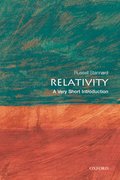
By Russell Stannard
Is there such a thing as a Higgs boson? To find out, one builds the Large Hadron Collider. That is how science normally progresses: one poses a question, and then carries out the appropriate experiment to find the answer.
But the more far-reaching discoveries come not from answering such questions. Rather they come from discovering that some questions, although they seem to be perfectly reasonable, are in fact is not meaningful. Such instances reveal a fundamental flaw in one’s thinking, and herald the need for a radically new perspective.
Relativity theory offers several examples. Take the famous Michelson Morley experiment. The motivation behind this was the recognition that light is made up of electromagnetic waves. Waves, such as sound and water waves, require a medium. Thus light (so the argument went) needed a medium; it was named the aether. Light passes through the empty space between the sun and the earth, so the aether must fill all of space. A very reasonable question arises: In its journey round the Sun, how fast is the Earth moving relative to the aether? The aforementioned experiment revealed no movement. There was no aether; electromagnetic waves do not require a medium.
Closer examination of the behaviour of light then leads into Einstein’s revolutionary Special Theory of Relativity. This is concerned with the effects on space and time of uniform motion. One of the consequences of this is that a mission controller at Houston, observing a high speed space ship passing by, concludes that time on the space ship is going more slowly than his own. The astronaut’s clock is lagging behind his. However, because the motion is relative, the astronaut has an equal right to use the theory to conclude that time on Earth is going slow, and the controller’s clock is the one that is lagging. But surely they can’t both be lagging behind each other, can they? Which one (if either) is really going slow? A perfectly reasonable question. Except that it is not. It assumes that there is some kind of absolute time against which the clocks can be compared. But there is none. The word ‘time’ is meaningful only in the context of it being related to a particular observer with a well-defined motion relative to the phenomenon being observed. There is the astronaut’s time, and there is the controller’s time, but there is no THE time.
Einstein’s General Theory of Relativity goes a stage further to incorporate the effects on space and time of gravity. It provides us with our understanding of the Universe as a whole. As is well known, the Universe began with a Big Bang. So, what caused the Big Bang? Again a perfectly legitimate question to ask. Or is it? According to a widely held belief, the Big Bang saw not only the coming into existence of the contents of the universe but also the coming into existence of space and of time. There was no time before the Big Bang. Cause comes before the effect. Any cause of the Big Bang must have come before it. But where the Big Bang is concerned, there is no before. Hence it is meaningless to ask about its cause.
So much for relativity theory. How about quantum theory? We have seen how light travels through space as a wave. But when it reaches its destination, and gives up its energy on impact, it switches over to being a particle (called a photon). This so-called wave-particle duality affects everything — electrons, protons, atoms, molecules. Travelling through space they act as waves, but in their interactions with matter they behave like particles. But how can something be both a spread-out wave and at the same time, a tiny localised particle. Is an electron really a particle, or really a wave? Again, it sounds a perfectly reasonable question to ask.
It was Niels Bohr who claimed that it was nothing of the sort. According to his Copenhagen Interpretation of quantum physics, we have to stop asking all questions that begin “What is…?” Science does not answer such questions. All we can meaningfully talk about are our observations of the world. One either observes the electron to be travelling through space, in which case one uses the word “wave”, or one observes it interacting, in which case one uses the word “particle”. One can’t be doing both at the same time, so there is no call to use both words at the same time. Thus, the wave/particle paradox is solved.
It used to be thought that the job of science was to describe the world. One has to look at it, and experiment on it, in order to find out what kind of world it is. But having made the observations, what one writes down in the physics text-books is a description of the world as it is whether or not one is still observing it. However, according to this interpretation of what is going on, one has done nothing of the kind. All one’s questioning — even the legitimate questioning — has revealed nothing whatsoever about the world as it is in itself, only what it is like to observe that world.
Russell Stannard is Emeritus Professor of Physics at the Open University, UK. He is the author of Relativity: A Very Short Introduction. His other recent books include The End of Discovery, and Science and Belief: The Big Issues.
The Very Short Introductions (VSI) series combines a small format with authoritative analysis and big ideas for hundreds of topic areas. Written by our expert authors, these books can change the way you think about the things that interest you and are the perfect introduction to subjects you previously knew nothing about. Grow your knowledge with OUPblog and the VSI series every Friday and like Very Short Introductions on Facebook.
Subscribe to the OUPblog via email or RSS.
Subscribe to only VSI articles on the OUPblog via email or RSS.
Subscribe to only physics and chemistry articles on the OUPblog via email or RSS.
Image credit: ?? by Jérôme Paniel [Creative Commons licence] via Wikimedia Commons.



Recent Comments
There are currently no comments.